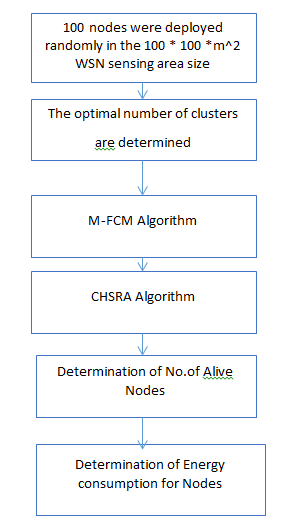An Improved Energy Efficient Clustering Protocol to Prolong the Lifetime of the WSN-Based IOT
Objective
The main objective of this project is to reduce the energy consumption in Wireless Sensor Networks.
Abstract
The Internet of Things relies heavily on wireless sensor networks (WSNs) (IoT). However, the energy resources of sensor nodes in a WSN-based IoT network are restricted. By grouping nodes into clusters to reduce the transmission distance between sensor nodes and base stations, a clustering protocol offers an effective method for ensuring node energy savings and extending network lifespan (BS). Current clustering protocols, on the other hand, have problems with the clustering mechanism, which has a negative impact on their efficiency. We suggest an enhanced energy-efficient clustering protocol (IEECP) in this paper to extend the lifespan of WSN-based IoT devices.
The proposed IEECP is divided into three parts. For the overlapping balanced clusters, an optimum number of clusters is first calculated. The balanced-static clusters are then developed using a tweaked fuzzy C-means algorithm in combination with a mechanism to minimize and balance the sensor nodes' energy consumption. Finally, cluster heads (CHs) are chosen in optimal locations by rotating the CH function among cluster members using a new CH selection-rotation algorithm that combines a back-off timer mechanism for CH selection and a rotation mechanism for CH rotation. The suggested protocol, in particular, eliminates and balances energy consumption.
The proposed protocol, in particular, reduces and balances node energy usage by optimizing clustering structure, and IEECP is ideal for networks with a long lifespan. The findings of the assessment show that the IEECP outperforms current protocols.
KEYWORDS: Wireless sensor network, Internet of Things, clustering protocol, energy consumption,
network lifetime.
NOTE: Without the concern of our team, please don't submit to the college. This Abstract varies based on student requirements.
Block Diagram

Specifications
Software Requirements:
MATLAB R2018a or above
Hardware Requirements:
Operating Systems:
• Windows 10
• Windows 7 Service Pack 1
• Windows Server 2019
• Windows Server 2016
Processors:
Minimum: Any Intel or AMD x86-64 processor
Recommended: Any Intel or AMD x86-64 processor with four logical cores and AVX2 instruction set support
Disk:
Minimum: 2.9 GB of HDD space for MATLAB only, 5-8 GB for a typical installation
Recommended: An SSD is recommended A full installation of all MathWorks products may take up to 29 GB of disk space
RAM:
Minimum: 4 GB
Recommended: 8 GB
Learning Outcomes
- Introduction to Matlab
- What is EISPACK & LINPACK
- How to start with MATLAB
- About Matlab language
- Matlab coding skills
- About tools & libraries
- Application Program Interface in Matlab
- About Matlab desktop
- How to use Matlab editor to create M-Files
- Features of Matlab
- Basics on Matlab
- Basics of wireless communications
- How system modal can be formed in Matlab.
- Construction of algorithm according to system modal
- Analyzing and visualization of plots.
- Phases of data transmission:
- Generation of input signal
- Construction of transmitter
- Formation of channel
- Construction of receiver
- How to extend our work to another real time applications
- Project development Skills
- Problem analyzing skills
- Problem solving skills
- Creativity and imaginary skills
- Programming skills
- Deployment
- Testing skills
- Debugging skills
- Project presentation skills
- Thesis writing skills





 Paper Publishing
Paper Publishing
